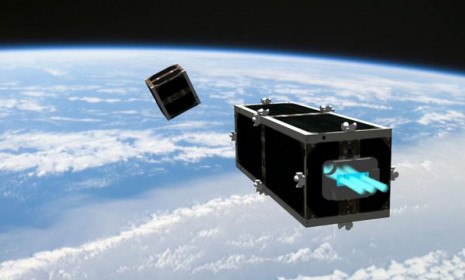The 'janitor satellite' that cleans up space junk
Over 500,000 pieces of dangerous debris are flying around Earth, but a new initiative could help reduce the threat

A free daily email with the biggest news stories of the day – and the best features from TheWeek.com
You are now subscribed
Your newsletter sign-up was successful
Swiss scientists have come up with a creative way to clean up the debris that's threatening various countries' efforts in space: Send out a janitor of sorts. The concept, CleanSpace One, is a remote clean-up satellite expected to see space duty in the next five years. Here, a brief guide to the project, which is currently being developed at the Swiss Space Center in the Federal Institute for Technology:
What's so dangerous about space debris?
Huge chunks of rocket parts and other launch remnants — up to 500,000, according to NASA — are orbiting our planet at breakneck speeds of up to 18,000 mph. Larger pieces of this junk can smash into working satellites and manned spacecraft, causing damage or even destruction. According to Alok Jha at the Guardian, "the International Space Station has to regularly alter its orbit to avoid being hit...."
The Week
Escape your echo chamber. Get the facts behind the news, plus analysis from multiple perspectives.

Sign up for The Week's Free Newsletters
From our morning news briefing to a weekly Good News Newsletter, get the best of The Week delivered directly to your inbox.
From our morning news briefing to a weekly Good News Newsletter, get the best of The Week delivered directly to your inbox.
How does this "janitor satellite" tackle the trash?
By aligning its trajectory with the target using an "ultra-compact motor," latching onto the debris, and heading back down to Earth where both burn up in the atmosphere. Of course, at speeds up to 18,000 mph, "this will not be an easy task, especially if the junk is rotating," says the Guardian.
So the "janitor satellite" burns up, too? Isn't that awfully inefficient?
Yes, and expensive, given that each version of the satellite will cost $11 million. "So far," says Tim Hornyak at CNET, "CleanSpace One would be a one-shot deal, with each successor going up into orbit for a single mission. That would mean a heck of a long time before multiple satellites can make a dent in the floating junkyard."
A free daily email with the biggest news stories of the day – and the best features from TheWeek.com
So what's the alternative?
Ground-based lasers and other novel solutions have been proposed to deal with our planet's trash problem, says CNET's Hornyak , but "it seems that a more practical solution is to build sustainability into satellite and rocket design." If we don't litter here on Earth, why do it in space?